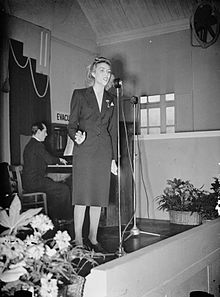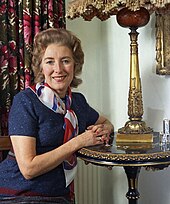Dame Vera Margaret Lynn CH DBE OStJ (née Welch; 20 March 1917 – 18 June 2020) was an English singer and entertainer whose musical recordings and performances were very popular during World War II. She is honorifically known as the "Forces' Sweetheart", having given outdoor concerts for the troops in Egypt, India and Burma during the war as part of the Entertainments National Service Association (ENSA). The songs most associated with her include "We'll Meet Again", "(There'll Be Bluebirds Over) The White Cliffs of Dover", "A Nightingale Sang in Berkeley Square" and "There'll Always Be an England".
She remained popular after the war, appearing on radio and television in the United Kingdom and the United States, and recording such hits as "Auf Wiederseh'n, Sweetheart" and her UK number-one single "My Son, My Son". Her last single, "I Love This Land", was released to mark the end of the Falklands War. In 2009, at the age of 92, she became the oldest living artist to top the UK Albums Chart with the compilation album We'll Meet Again: The Very Best of Vera Lynn.[1] In 2014, she released the collection Vera Lynn: National Treasure and in 2017, she released Vera Lynn 100, a compilation album of hits to commemorate her centenary—it was a No. 3 hit, making her the first centenarian performer to have a Top 10 album in the charts.[2] By the time of her death in 2020 she had been active in the music industry for 96 years.
Lynn devoted much time and energy to charity work connected with ex-servicemen, disabled children and breast cancer. She was held in great affection by Second World War veterans and in 2000 was named the Briton who best exemplified the spirit of the 20th century.[3]
Early life
Vera Margaret Welch was born in East Ham, Essex, now part of the London Borough of Newham, on 20 March 1917.[4] She was the daughter of plumber[5][6] Bertram Samuel Welch (1883–1955) and wife dressmaker Anne "Annie" Martin (1889–1975), who had married in 1913.[7] In 1919, when Lynn was two years old, she fell ill with diphtheritic croup and nearly died. She was sent to an isolation unit and was discharged after three months there.[8] As a result of her hospitalisation, her mother was very protective of her and did not allow her to visit friends or play in the street for a long time afterwards. Lynn recalled her mother was not as strict with her elder brother Roger as she was with her.[9]
Career
She began performing publicly at the age of seven and adopted her maternal grandmother Margaret's maiden name "Lynn" as her stage name when she was eleven.[10] Aged 11, she joined a juvenile troupe called Madame Harris's Kracker Kabaret Kids and early in 1933 she was spotted by Howard Baker who invited her to join his band. In turn, she was taken on by Billy Cotton and briefly toured with his band in 1934 before returning to Howard Baker.[11]
It was with Baker that she made her first record, on 17 February 1935, with a song called "It's Home".[12] Her first radio broadcast, with the Joe Loss Orchestra, was made on 21 August 1935.[13] At this point she appeared on records released by dance bands including those of Loss and of Charlie Kunz.[14] In 1936, her first solo record was released on the Crown label, "Up the Wooden Hill to Bedfordshire".[15] This label was absorbed by Decca Records in 1938.[16] She supported herself by working as an administrative assistant to the head of a shipping management company in London's East End.[17] After a short stint with Loss she stayed with Kunz for a year or so during which she recorded several standard musical pieces. She joined the Ambrose band in 1937,[18] and remained with him until 1940, when she went solo.
Wartime career
Lynn's wartime contribution began when she would sing to people who were using London's tube station platforms as air raid shelters. She would drive there in her Austin 10 car.[19] Between 1937 and 1940, she also toured with the aristocrat of British dance bands, Bert Ambrose[20] as part of the Ambrose Octet; the group appeared in broadcasts for the BBC and for Radio Luxembourg. She left Ambrose in 1940.[21]
During the Phoney War, the Daily Express asked British servicemen to name their favourite musical performers: Vera Lynn came out on top and as a result became known as "the Forces' Sweetheart". On 1 July 1940, Lynn made her first appearance as a "fully fledged solo act" at the New Hippodrome in Coventry.[22]
Vera Lynn appeared in the revue Applesauce! with Max Miller, which commenced on 22 August 1940 at the Holborn Empire and ran until 9 September 1940. Its run was curtailed due to a bomb destroying the theatre. The revue continued at the London Palladium from 5 March 1941 and ended on 29 November that year.[23] Lynn had to leave the show for a while in July 1941 to have her appendix removed.[24]
Lynn is best known for the popular song "We'll Meet Again", written by Ross Parker and Hughie Charles.[25] She first recorded it in 1939 with Arthur Young on Novachord, and later again in 1953 accompanied by servicemen from the British Armed Forces.[26] The nostalgic lyrics ("We'll meet again, don't know where, don't know when, but I know we'll meet again some sunny day") were very popular during the war and made the song one of its emblematic hits.[27] Amongst her other well-known wartime hits was "The White Cliffs of Dover", with words by Nat Burton, music by Walter Kent.[28]
Her continuing popularity was ensured by the success of her weekly 30-minute radio programme Sincerely Yours, which began airing at 9:30 p.m. on 9 November 1941, with messages to British troops serving abroad.[21][14] Described as "to the men of the forces – a letter in words and Music", she was accompanied by Fred Hartley and his music.[29] Lynn and her quartet performed songs most requested by the soldiers. Lynn also visited hospitals to interview new mothers and send personal messages to their husbands overseas.[30] However, in the aftermath of the fall of Singapore in February 1942 the programme was taken off air after the broadcast on 22 March 1942[31] for 18 months out of fear that the sentimental nature of her songs would undermine the "virile" nature of British soldiers. Instead, "more traditionally martial classical music" was promoted.[32] Lynn returned with a regular show called "It's Time for Vera Lynn" on the BBC's Forces programme on 31 October 1943, when she was accompanied by Peter Yorke and His Orchestra. The show was broadcast at 8 p.m. on Sunday nights and ran for twenty minutes.[33]
During the war years, she joined the Entertainments National Service Association (ENSA) and toured Egypt, India and Burma,[34] giving outdoor concerts for British troops. In March 1944, she went to Shamshernagar airfield in Bengal to entertain the troops before the Battle of Kohima. Her host and lifelong friend Captain Bernard Holden recalled "her courage and her contribution to morale".[35] In 1985, she received the Burma Star for entertaining British guerrilla units in Japanese-occupied Burma.[36]
Between 1942 and 1944, she appeared in three movies with wartime themes.[21] Firstly, she starred in a film called We'll Meet Again, in 1943 which was based on her own life story, that of a dancer who becomes a radio star. She went on to make two more films during the war, Rhythm Serenade (1943)[37] and One Exciting Night (1944). In Rhythm Serenade she played a school teacher. After her school is closed, she tries to join up. However, she is persuaded to organise a nursery for a munitions factory. One Exciting Night (also known as You Can't Do Without Love) was a dramatic musical comedy in which she helps thwart a gang of art thieves.
Postwar career
Lynn's daughter and her only child, Virginia Penelope Ann Lewis, was born on 10 March 1946. After the war, Lynn had wanted to concentrate on being a mother and wife. However, her unfulfilled contract with Decca Records and financial pressures meant that she was lured back into showbusiness in 1947. She started a new radio show called Vera Lynn Sings on the BBC's Light Programme on 16 February 1947.[38] This was broadcast on Sunday evenings from 9:30-10:00 p.m. with Robert Farnon leading the musical accompaniment. Her husband became her manager. Her record label, Decca, astutely promoted her records in the U.S. during the musicians' strike of 1948 and she had a U.S. Top Ten hit with "You Can't Be True, Dear". In 1949, the BBC dropped her radio show because it claimed that there was no demand for her "sob stuff"; they wanted her to sing in a more lively style, so she made shows for Radio Luxembourg instead.[39]
Lynn kept touring and recording, and in 1952 Lynn's British recording of a German song, "Auf Wiederseh'n, Sweetheart", became her best selling record. It became the first record by a British performer to top the charts in the United States,[40] remaining there for nine weeks. In Britain, the song was the best-selling record of the year.[41] She also appeared regularly for a time on Tallulah Bankhead's US radio programme The Big Show.[42] "Auf Wiederseh'n, Sweetheart", along with "The Homing Waltz" and "Forget-Me-Not", gave Lynn three entries on the first UK Singles Chart in November 1952.[43]
Vera Lynn was in the London Laughs revue at the Adelphi Theatre, London from 12 April 1952 to 6 February 1954 with Tony Hancock and Jimmy Edwards.[44] Her popularity continued in that decade, peaking with "My Son, My Son", a number-one hit in 1954[45] written by Gordon Melville Rees, Bob Howard and Eddie Calvert. It also reached No. 28 on Billboard magazine's singles charts in the USA.[46]
In 1956, Lynn began her first television series for Associated-Rediffusion. During the same year, she signed an exclusive contract with the BBC for two years of radio and television work.[21]
In 1960, she left Decca Records (after nearly 25 years) and joined EMI.[47] She recorded for EMI's Columbia, MGM and HMV labels. She also recorded Lionel Bart's song "The Day After Tomorrow" for the 1962 musical Blitz!; she did not appear onstage in the play, but the characters in the play hear the song on the radio while they shelter from the bombs.[48] In 1967, she recorded "It Hurts To Say Goodbye",[49] a song which hit the top 10 on the Billboard Easy Listening chart.[50]
She hosted her own variety series on BBC1 in the late 1960s and early 1970s[51] and was a frequent guest on other variety shows such as the 1972 Morecambe & Wise Christmas Show. In 1972, she was a key performer in the BBC anniversary programme Fifty Years of Music. In 1976, she hosted the BBC's A Jubilee of Music, celebrating the pop music hits of the period 1952–1976 to commemorate the start of Queen Elizabeth II's Silver Jubilee year. For ITV, she presented a 1977 TV special to launch her album Vera Lynn in Nashville, which included pop songs of the 1960s and country songs.[52]
The Royal Variety Performance included appearances by Vera Lynn on seven occasions: 1951,[53] 1952,[54] 1957,[55] 1960, 1975, 1986 and 1990.[56][57] Lynn was also interviewed about her role in entertaining the troops in the India-Burma Theatre, for The World at War series in 1974. Lynn is also notable for being the only artist to have a chart span on the British single and album charts reaching from the chart's inception to the 21st century – in 1952 having three singles in the first ever singles chart, compiled by New Musical Express,[58] and later having a No. 1 album with We'll Meet Again – The Very Best of Vera Lynn.[59]

